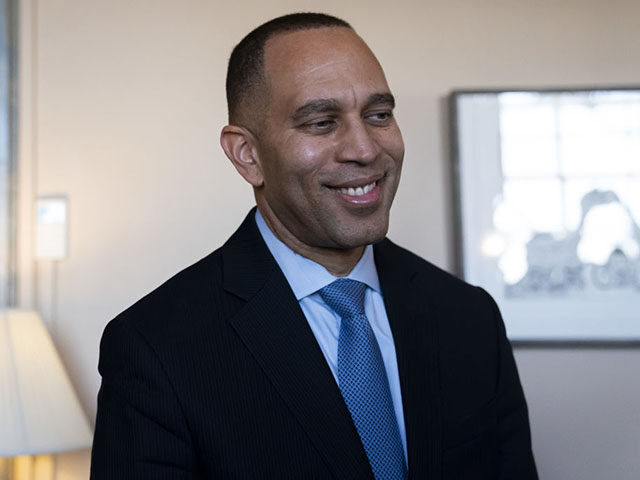Republicans failed to unite around one House speaker candidate on the first round of voting on Tuesday, leading to a second round of voting as the chamber’s top position remains in the balance.
House Minority Leader Kevin McCarthy (R-CA) received 203 votes, while incoming House Minority Leader Hakeem Jeffries (D-NY) received 212 votes, one from every Democrat member present.
Nineteen Republicans voted for someone other than McCarthy, which resulted in no candidate receiving the majority needed to win the speaker race after the first round of voting.
The last time the House was unsuccessful at nominating a speaker on the first round was in 1923, when it took nine ballots to reelect then-Speaker Frederick Gillett.
McCarthy has long made clear his intentions to lead the House but has faced weeks of painstaking opposition from a handful of defectors led by Reps. Andy Biggs (R-AZ), Matt Gaetz (R-FL), and others.
Defectors were scattered in terms of whom they supported. As their names were called, they stood up to announce votes for Biggs, Rep. Jim Jordan (R-OH), Rep. Jim Banks (R-IN), Rep. Lee Zeldin (R-NY), or Rep. Byron Donalds (R-FL).
Jordan, the incoming Judiciary Committee chair who has been advocating for McCarthy, began whipping votes in favor of McCarthy after the first vote failed, and then stepped up to nominate McCarthy for the second round of voting. Jordan told Breitbart News in March 2022 that he would “be happy to” nominate McCarthy if McCarthy asked him to.
McCarthy first ran for the speaker position in 2015 when then-Speaker John Boehner stepped down. In 2021, he put on a show of force for eight and a half hours as he used the “magic minute” afforded to House leaders to rail against President Joe Biden’s Build Back Better Act. In 2022, he rolled out the “Commitment to America,” presenting a GOP vision to tackle border security, crime, threats presented by the Chinese Communist Party, and more.
Republican House Conference chair Rep. Elise Stefanik (R-NY) nominated McCarthy in the first round of voting, praising him for leading Republicans through historic GOP gains in the 2020 midterms and a House flip in 2022.
McCarthy “knows how to build consensus,” Stefanik declared.
Meanwhile Rep. Pete Aguilar (D-CA) nominated Jeffries, calling him “the pride of Brooklyn” and emphasizing how Democrats were “united” in their support for Jeffries.
Rep. Paul Gosar (R-AZ) nominated fellow Arizonan Biggs, who has openly been running against McCarthy for speaker since November.
Republican defectors’ choices in the first round of voting were broken down as follows:
Biggs
- Rep. Andy Biggs
- Rep. Dan Bishop
- Rep. Andrew Clyde
- Rep.-elect Eli Crane
- Rep. Matt Gaetz
- Rep. Bob Good
- Rep. Paul Gosar
- Rep. Scott Perry
- Rep. Matt Rosendale
- Rep. Ralph Norman
Jordan
- Rep. Lauren Boebert
- Rep. Michael Cloud
- Rep.-elect Anna Paulina Luna
- Rep.-elect Andy Ogles
- Rep. Mary Miller
- Rep.-elect Keith Self
Donalds
- Rep. Chip Roy
Zeldin
- Rep. Andy Harris
Banks
- Rep. Josh Brecheen
No other House business, such as passing legislation or holding hearings, can occur until a speaker is elected.
This story is developing. Follow Breitbart News for more coverage.
Write to Ashley Oliver at aoliver@breitbart.com. Follow her on Twitter at @asholiver.

COMMENTS
Please let us know if you're having issues with commenting.